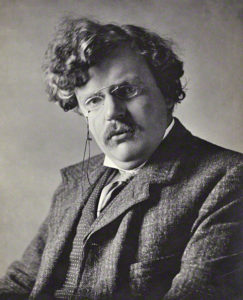G.K. Chesterton and the Book of Job

G.K. Chesterton’s introduction to The Book of Job, worthy itself of an introduction, contains several profound ideas inspired by this profoundest of Old Testament books. Here is one that got me thinking:
“If prosperity is regarded as the reward of virtue it will be regarded as the symptom of virtue. Men will leave off the heavy task of making good men successful. They will adopt the easier task of making our successful men good.” — G.K. Chesterton, Introduction to The Book of Job, published by S. Wellwood, London, 1907
Prosperity is commonly defined as a combination of worldly wealth and power. If we believe God punishes us for our sins by making us poor and powerless, and rewards us for our virtue by making us rich and powerful, then we have fallen into a trap.
Eventually we reverse engineer the equation, and conclude that if we are poor and powerless, then we are sinful, and if we are rich and powerful, we are virtuous. Thus, if the rich and powerful lie and cheat, then lying and cheating are virtues. The movie Wall Street illustrates this muddling of good and evil quite memorably:
The Book of Gekko
Wall Street gets it right in showing how vice rather than virtue produces wealth and power, how Gecko then recasts vice as virtue, and how finally the world eagerly embraces Gekko’s example. But then Wall Street gets it wrong by showing Gekko’s vice being punished in the world. This is not necessarily how things happen down here on earth. As often as not, it’s the corrupt plutocrat who dies peacefully in his sleep at the age of 95, and the saint who is burned at the stake before turning 20.
For the rich and powerful — and for those who aspire to wealth or admire those who have it — a guilty conscience over ill-gotten gains can be dodged by believing there is no God, and therefore no absolute virtue or vice, and therefore no punishment coming in the next world (assuming there is one).
This (lack of a) belief system explains why the the rich and powerful are prone to engage in satanism, sexual abuse, and other seriously scandalous behavior without batting an eye. Many examples of this have recently come to light in the entertainment industry, but few wonder there is much more still in the shadows, out of the spotlight for now. The values promoted in Hollywood entertainment are merely a reflection of the values held by the people who made them.
Moral Schizophrenia
But if reverse engineered morality — defining what is moral based on worldly outcomes — is so prevalent, then why do we take such satisfaction in seeing Gordon Gekko get what’s coming to him? Why do we lap up movie after movie that promotes promiscuity and violence, and then relish taking down movie moguls who are merely practicing what they preach? Why do we elect corrupt representatives, and then applaud their comeuppance when a sexual scandal or illegal business deal is revealed?
It could be that we cannot completely escape the imprint of God on our souls.No matter how hard we try to bury virtue under a reverse engineered morality, eventually virtue rises from the rubble, if only for an occasional breath of air. Job had every reason to doubt God, but never did. That was his reward.
As to why evil so often thrives in the world, Chesterton has an answer in his introduction to The Book of Job, a most famous one —
“The riddles of God are more satisfying than the solutions of man.”

Love this Berrmot.
It would appear that Robert Mugabe is destined to die peacefully in his sleep as saints in the middle east are beheaded. Is this 2017? God’s economy is decidedly not the same as ours.
Thanks, Greg. You are so right. But I guess if God’s economy were crystal clear to us, there wouldn’t be much need of faith.